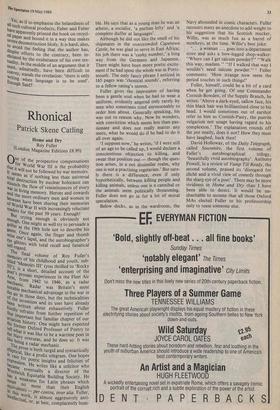Rhonical
Patrick Skene Catling
Home and Dry Roy Fuller Roy Fuller
(London Magazine Editions £8.95) One of the prospective compensations for World War III is the probability that it will not be followed by war memoirs. It seems as if nothing less than universal total destruction by nuclear holocaust can staunch the flow of reminiscences of every war in hying memory. Heroes and cowards and the more ordinary men and women in between have been sharing their memories (n. World War II with increasingly reluctant readers for the past 39 years. Enough! But crying enough is obviously not enough. One might as well try to persuade a golfer at the 19th hole not to describe his game. Once again, the finger and thumb seize one's lapel, and the autobiographer 's elglitters with total recall and fanatical sel,f-regard. he final volume of Roy Fuller's
me inoirs of his childhood and youth, sub- 'Memoirs (you thrilled to 'Rocky
A), is a short, detailed account of the rjet's prosaic experiences in the Fleet Air , from 1942 to 1946, as a radar mechanic. Radar was Britain's most rr the mechanical advantage in the war in 1(1)e air in those days, but the technicalities the invention and its uses have already i'(!en written about exhaustively. Fuller thlndly refrains from further repetition of important but familiar chapter of our latIon history. One might have expected 17 former Oxford Professor of Poetry to the what it was like to be a wartime poet in like Navy overseas, and he does so. It was _e being a radar mechanic. _„,lhe. prose is both turgid and syntactically vitiliiptical like a prolix telegram. One hopes vai.for poetic insights and felicities of bZressl°n. He writes like a solicitor who w 'Me. eventually a director of the han°Iwich Equitable Building Society. He me a weakness for Latin phrases which eq, mean no more than their English
Mvni
int thi;ents per contra, inter alia. Fuller, work, is almost aggressively anti- e"eetual, or, at best, complacently hum-
ble. He says that as a young man he was an atheist, a socialist, 'a puritan lefty' and 'a complete duffer at languages'.
Although he did not like the smell of his shipmates in the overcrowded Capetown Castle, he was glad to serve in East Africa; his job there was a 'cushy number,' a long way from the Germans and Japanese. There might have been more poetic excite- ment if he had spent the whole war in Ports- mouth. The only fancy phrase I noticed in 165 pages was `rhonical sounds', referring to a fellow rating's snores.
Fuller gives the impression of having been a gentle soul when he had to wear a uniform, evidently angered only rarely by men who sometimes tried unreasonably to order him about. Generally speaking, his was not to reason why. Now he wonders, with conviction which seems less than pas- sionate and does not really matter any more, what he would do if he had to do it all over again. `I suppose now,' he writes, 'if I were still of an age to be called up, I would declare a conscientious objection to killing, and sweat that position out — though the ques- tion arises, in a not dissimilar realm, why one is not a practising vegetarian.' But sure- ly there is a difference, even if only hypothetically, between killing people and killing animals, unless one is a cannibal or the animals seem politically threatening. Fuller does not go in for a lot of moral speculation. Below decks, as in the wardroom, the Navy abounded in comic characters. Fuller recounts many an anecdote to add weight to his suggestion that his Scottish mucker, Willie, was as much fun as a barrel of monkeys, at the time. Willie's best joke: . a woman ... goes into a department store and asks a bow-legged shop-walker: "Where can I get talcum powder?" "Walk this way, madam." "If I walked that way I wouldn't need talcum powder." ' Fuller comments: 'How strange now seem the period touches in such things!'
Fuller, himself, could be a bit of a card when he got going. Of one Commander Cornish-Bowden, of the Supply Branch, he writes: 'Above a dark-eyed, sallow face, his thin black hair was brilliantined close to his head. I would sometimes out of earshot refer to him as Cornish-Pasty, the puerile vulgarism not unapt having regard to his complexion.' The explanation rounds off the jest neatly, does it not? How they must have laughed, back then!
David Holloway, of the Daily Telegraph, called Souvenirs, the first volume of
Fuller's autobiographical trilogy,
`beautifully vivid autobiography'. Anthony Powell, in a review of Vamp Till Ready, the second volume, praised its 'disregard for
cliche and a vivid view of comedy through the sharp eye of a poet'. There may be more
vividness in Home and Dry than I have been able to detect. It would be un- charitable to assume that all those Oxford MAs elected Fuller to his professorship only to tease someone else.














































 Previous page
Previous page